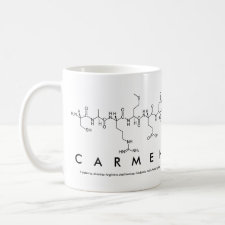
Authors: Burova TV, Grinberg NV, Kalinina EV, Ivanov RV, Lozinsky VI, Alvarez-Lorenzo C, Grinberg VY
Article Title: Thermoresponsive Copolymer Cryogel Possessing Molecular Memory: Synthesis, Energetics of Collapse and Interaction with Ligands.
Publication date: 2011
Journal: Macromolecular Chemistry And Physics
Volume: 212
Issue: (1)
Page numbers: 72-80.
DOI: 10.1002/macp.201000382
Abstract: An imprinted thermoresponsive cryogel of copolymer of N-isopropylacrylamide and N-[3-(N,N'-dimethylamino)propyl]acrylamide was synthesized in a frozen (-10 °C) aqueous medium in presence of a molecular template, the drug substance ibuprofen. A reversible volume phase transition upon heating (thermotropic collapse) of the swollen cryogel was studied by high-sensitivity differential scanning calorimetry. In the absence of ligands, the transition temperature, enthalpy, and width were 82.5 °C, 9.8 J g-1 and 32.2 °C, respectively. Significant changes in the transition parameters were observed in presence of the template ligand (ibuprofen): with increasing ligand concentration the transition temperature decreased down to 30 °C, the enthalpy passed through a minimum, and the transition width notably reduced. The binding constants of ibuprofen by the cryogel subchains in the collapsed and swollen states were 119 and 5 M-1, respectively. This implies a preferential binding of ibuprofen by the shrunken cryogel. The excess absorption of ibuprofen by the cryogel related to its collapse amounted to 0.327 mmol g-1 while for all other ligands that were structural analogs of ibuprofen this parameter did not exceed 0.016 mmol g-1. Consequently, the imprinted cryogel possessed a selective molecular memory toward the template ligand
Template and target information: ibuprofen
Author keywords: collapse, Cryogels, differential scanning calorimetry, molecular imprinting, stimuli-sensitive polymers



Join the Society for Molecular Imprinting

New items RSS feed
Sign-up for e-mail updates:
Choose between receiving an occasional newsletter or more frequent e-mail alerts.
Click here to go to the sign-up page.
Is your name elemental or peptidic? Enter your name and find out by clicking either of the buttons below!
Other products you may like:
 MIPdatabase
MIPdatabase









